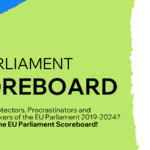CAN Europe: This ETS reform cares less about saving the climate than about protecting industry.
Today the European Commission released their proposed changes to the European Emissions Trading Scheme (ETS) for after 2020. CAN Europe welcomes the timely release of the proposal but criticises the proposal’s lack of vision and leadership.
The ETS just turned ten years old but it has still not delivered on its goal to facilitate the transition towards a renewable and energy efficient economy. Because of very weak reduction targets a massive oversupply of pollution permits has accumulated. Carbon prices, once predicted to be around €30 hover now around €7, so low that they do nothing to cut emissions in Europe.
CAN Europe criticises that the ETS reform proposal tabled by the Commission does not address the failings of the ETSand if implemented would continue to delay climate action in Europe’s power and industrial sectors until 2030.
“The proposal does not take into account that the EU Council explicitly decided that the EU should reduce its greenhouse gas emissions by ‘at least’ 40% ” said Wendel Trio, director of CAN Europe. “Fixing the ETS would mean setting a more ambitious target and cancelling the 2.5 to 4.5 billion surplus allowances that will have accumulated by 2020. This would ensure that the EU’s climate targets are met by actual emission reductions rather than with left over surplus.”
CAN Europe also criticises that the proposal perpetuates industry handouts instead of prioritizing climate protection. The ETS is supposed to make polluters pay, but instead it has been paying the polluters. The generous exemptions in the form of free pollution permits have led to windfall profits for large energy intensive companies on the backs of EU citizens.
The current proposal does not stop industry handouts but will hand out over 6 billion free pollution permits from 2021-2030, worth €80-200 billion. This despite the fact that the Commission itself has repeatedly stated that there is no evidence for carbon leakage. Instead of subsidizing carbon pollution, the money should be used to fund more emission cuts and to support adaptation to an already changing climate.
“The ETS reform is an opportunity for the EU to restore its leadership in climate action. Requiring that part of the ETS revenues are used for climate protection in poor countries would help overcome roadblocks to a meaningful international climate agreement in Paris this December,” said Wendel Trio.
CAN Europe is calling on EU Member States and the Members of the European Parliament to push for reforms that would turn the ETS from a paper tiger into a strong climate protection instrument that helps the EU deliver on its long term climate goals.
Background
The legislative proposal implements the Council Conclusion from October 2014 on the 2030 Climate and Energy package. The proposal includes:
- Implementation of the 43% reduction target for the ETS sectors.
- New rules on free allocation of ETS pollution permits to address carbon leakage. (Carbon leakage occurs when a company moves outside of the EU because of the ETS to a country that does not charge for climate pollution.)
- Implementation of the funds that aim to help finance low-carbon technologies, including the Innovation Fund (currently called NER300) and the new Modernization Fund.
The ETS reform proposal is part of the Commission’s ‘summer package’. For an assessment of the Energy Labelling Directive reform, please check out this blog.
Contact
Anja Kollmuss, EU ETS policy coordinator at CAN Europe, anja@caneurope.org,
Climate Action Network (CAN) Europe is Europe’s largest coalition working on climate and energy issues. With over 120 member organisations in more than 30 European countries – representing over 44 million citizens – CAN Europe works to prevent dangerous climate change and promote sustainable climate and energy policy in Europe


